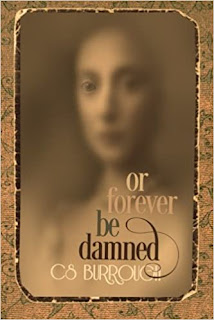I was so grateful to acclaimed author and perform Julian Wild, who wrote on Goodreads:
“Or Forever be Damned…” is a thoroughly engaging family saga that is a work of true historical and social relevance, taking us from the height of British Imperial power and relevance and on through the ensuing decades of decline and decadence: Societal values changing; some for the better, many not so. It is a work of not only historical importance, relayed in painstaking accuracy, but it is a study of social structure, involving disparities of class, religion and region. I was intrigued by the premise of the novel and by the subject matter: such topics within the novel being personally relatable; career situations and regional flavor so on point that only one who truly had lived in these places or times and known these people and their lives could convey such to the reader. And how C. S. Burrough has painted his canvas with such devotion to detail, such accuracy! His evidently painstaking devotion to authenticity is the gift he presents to the generations of readers who will be drawn to this tale. It reads like the historical saga it clearly is, with an ease and flow that is well paced and involving. One is drawn into the storyline from the first chapter.
It is a book to be considered on many facets. There is the startling fact of the changing times’ effects on attitudes, formalities, manners and practices. Then there is the story itself, apart from social relevance. Characters are well drawn and true, memorable for possessing identities gleaned from an authenticity born of knowledge. This genuine flavor makes the characters live. There is not the orthodox protagonist verses antagonist, as characters display both endearing and unfortunate characteristics, being at once sympathetic, then flawed. I prefer this, as it calls upon you, the reader, to reach your own determination as to whom is the more sympathetic and worthy of our emotional investment, thus keeping the reader engaged in the story-line, allowing one to reach one’s own conclusion of any message to be drawn from the epic saga. And epic it is! This is a work to be considered. It is also a work that will live with you long after you finish it.
Whilst reading this work I was wondering what particular message the author might be trying to pass along to the reader, if he had one at all – consciously or otherwise. But as I concluded the final page it came into clarity, exactly what message, what conclusion ought to be drawn from this fine work. I am glad to have read this work for that, and I would wish to thank the author for his efforts to that end. I would highly recommend this work to anyone, and would challenge them to discover what their own sincere conclusions would be upon finishing. Whether or not the author intended it, there is a message.

No comments:
Post a Comment